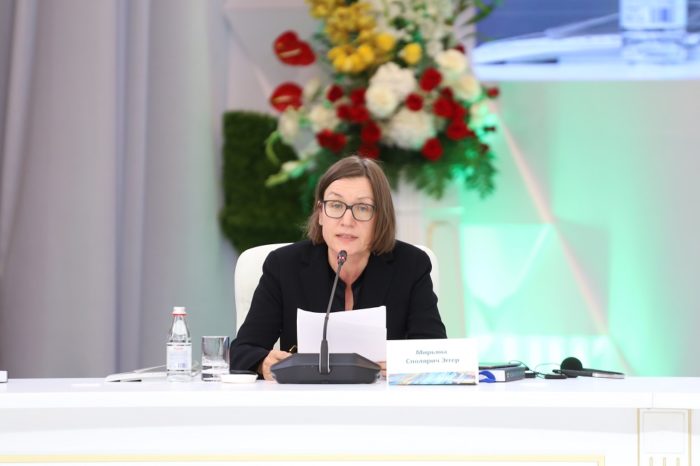NUR-SULTAN – United Nations Assistant Secretary-General and UNDP’s Regional Director for Europe and the CIS Mirjana Spoljaric Egger reaffirmed UNDP’s commitment to assist the Kazakh government in implementing its energy transition in an economically viable and socially fair way during her recent visit to the country.

UN Assistant Secretary-General Mirjana Spoljaric Egger delivered remarks at the Ways to Achieve the Goals of the Paris Agreement and Kazakhstan’s Carbon Neutrality conference in Nur-Sultan on Oct.13. Photo credit: UNDP Kazakhstan.
As part of her visit, Spoljaric Egger took part in the Ways to Achieve the Goals of the Paris Agreement and Kazakhstan’s Carbon Neutrality conference on Oct.13 in Nur-Sultan.
During the conference, Spoljaric Egger welcomed Kazakhstan’s Carbon Neutral Development until 2060 strategy saying that the country shows political will and the vision to lead the way. Central Asia will risk missing out on the energy transition “without decisive action.”
“Today, we are committed to take forward the vision of this conference, to collaborate with the government, its institutions and our joint partners, towards a future that is sustainable and prosperous for all,” Spoljaric Egger explained in an interview for this story.
Greenhouse gases in recent years have reached their highest levels yet leading to catastrophic climate change, according to the 2020 Human Development Report. The Paris Agreement has become a significant turning point in international climate policy.
Kazakhstan was the first among the CIS countries to ratify the Agreement on Dec. 6, 2016 and has since then consistently demonstrated its commitment to the development of a decarbonized economy, Spoljaric Egger said.
“However, to achieve the climate target of the Paris Agreement, wide-ranging societal and economic changes are necessary,” she explained. “According to the International Energy Agency, significant fossil fuel consumption subsidies are present in more than 40 countries, including in Kazakhstan. Such subsidies are incentives for wasteful fuel consumption; they exacerbate air pollution and increase greenhouse gas emissions. Their removal, on the other hand, coupled with carbon pricing and green fiscal reform, makes economic sense.”
The transition from fossil fuels to renewable energy represents a dramatic structural change to the economy, trade, and production bases. In this regard the domestic resource allocation, prioritizing a sustainable and low-carbon infrastructure is important.
Spoljaric Egger noted that the UNDP advocates for an end to fossil fuel subsidies as a critical step to divest from fossil fuels and invest in both people and the planet. The organization will continue to support countries with COVID-19 and green recovery plans that foster a transition to a low-carbon, climate-resilient and fair development path.
Spoljaric Egger also spoke about the upcoming 26th UN Conference of the Parties on Climate Change (COP 26) in Glasgow.
“The conference comes at a crucial point in time when humanity faces two existential crises – the COVID-19 pandemic, which is still taking lives and destroying livelihoods, and accelerating global warming, which amplifies natural disasters and inequalities. COP26 is also a critical moment for countries to make strong national climate pledges or Nationally Determined Contributions (NDCs) that will help the world to achieve the goals of the Paris Agreement,” she said.
The UNDP has provided support to Kazakhstan as part of the Climate Promise work plans.
“We supported the introduction of climate adaptation measures in the country’s revised NDCs with a focus on policies and measures to be undertaken by 2030. A roadmap for fulfilling commitments, where the main directions of national activities on adaptation and vulnerability assessment are specified, is under development to become a technical guideline for the Kazakh government on achieving its NDCs,” she said.
The Ambition From the Frontlines: Recognizing Champions with the Climate Promise event is expected to be one of the major events during COP 26 on Nov.3. The meeting will focus on bringing voices and success stories from the ground to the COP, with a particular attention on reflecting experiences under UNDP’s Climate Promise and how countries are advancing their NDC processes.
Equipping people with knowledge is first and foremost, said Spoljaric Egger. To raise awareness of the global climate crisis, the UNDP launched the Dear World Leaders initiative. People can share video messages explaining how climate change is affecting them and calls to action for world leaders. The videos will be featured on the platform dearworldleaders.org and presented at the COP 26.
The Peoples’ Climate Vote, the largest survey of public opinion on climate change, also demonstrated the world’s decision for greater climate action and choices that will shift priorities and transform our future. The survey covered 50 countries with 1.2 million respondents.
Concluding the interview, Spoljaric Egger reminded everyone that the UNDP’s work focuses on national priorities to sustain the country’s growth trajectory by diversifying the economy, transitioning to green energy, modernizing institutions, reducing inequalities and sustainably managing its natural resources.
“UNDP is a long-term and trusted partner of the Kazakh government since 1994. UNDP has implemented more than 200 projects worth more than $200 million at the national, regional, and local levels over the past 27 years, from improving irrigation networks to sustainable forest management, from piloting community policing model to digital transformation of the civil service system for better service delivery to the public,” she said.
